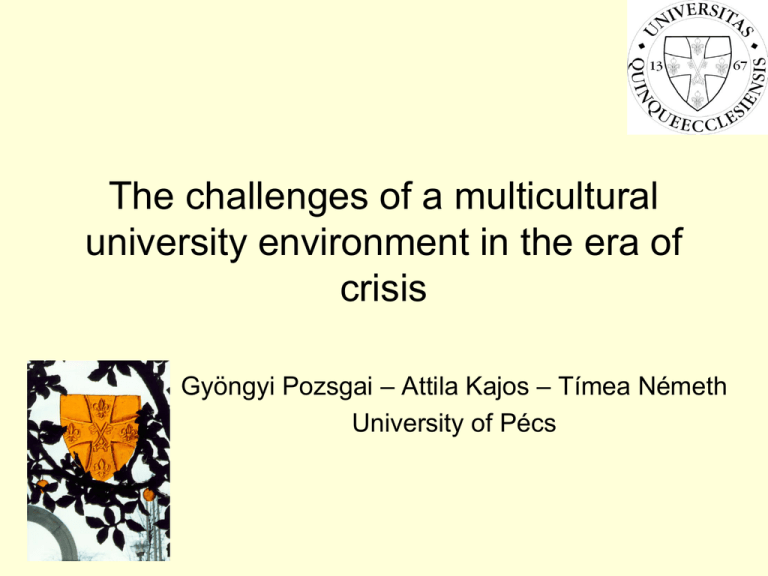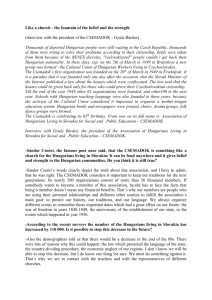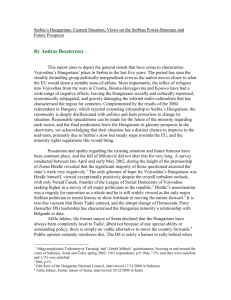The challenges of a multicultural university environment in the ear of
advertisement

The challenges of a multicultural university environment in the era of crisis Gyöngyi Pozsgai – Attila Kajos – Tímea Németh University of Pécs The aim of the presentation • To examine how/if crisis can stimulate intercultural dialogue and multicultural environment at the universities by the growing number of international students • To introduce the attitude of the international students towards the domestic students and through their relationships towards the domestic culture – comparing these data with the attitude of our Hungarian students towards international students and their cultures • Using the results of three surveys World trends Huge increase in international student enrollment • 2001: 1 million international students worldwide • 2009: 3,3 million international students • 2025: 8 million (UNESCO estimation) Reasons for growing importance of international student recruitment in the era of crisis financial benefits 1.on institutional level – to balance growing costs, decreasing govenmental support 2.on societal level - important financial commodity - contribution for the US economy – 19 billion USD, UK economy – 14 billion USD ( 2010) • solution for demographic decline – keeping the workplaces of the current lecturers, researchers bring new perspectives to the classroom experience - allow for home students to benefit from international experiences – can help their future employability on international Labour Market University of Pécs • Total student number ( 2010) : 27 963 • International students ( 2010): 1762 – 6,3 % • Largest international student groups come from Germany , Norway, Iran, Serbia, South Korea International programmes: • General Medicine and Dentistry in English and in German, Pharmacy in English • BA programme in Business Administration and MsC in Applied Management (validated by Middlesex University, London) • BA programme in Psychology Surveys 1. Survey I. (2010) Aim : To explore the motivations and decision making process of international students when choosing their place of study Methodology: on-line questionnaire 72 completed questionnaires conducted among the international students of UP 2. Survey II. (2011) Aim: To explore the attitude of foreign students to Hungarian students and culture Methodology : standard on-line questionnaire Completed surveys: 152 3. Survey III (2011) Aim: To examine the attitude of Hungarian students to foreign students and their culture Methodology: on-line questionnaire 103 completed questionnaires Carried out by 2 PhD students – University of Pécs, Faculty of Business and Economics Survey I. Main source of information about UP • Sequence of importance: : • The main source of information about the University of Pécs are the friends – former and current international students of UP Benefits of studying abroad The third most important benefit is to learn about different cultures Survey II. Do you consider the University of Pécs (UP) to have a mixture of different cultures? Do you consider the UP to have a mixture of different cultures? 3% Yes No 97% • 97% of them find that UP provides a multicultural environment Do you consider that these cultures are respected? • 85% of the students feel that the different cultures are respected - 15 % have experienced the opposite Have you ever felt that you have been treated differently due to your origin/culture? Have you ever felt that you have been treated differently at UP due to your origin/culture? 120 100 80 103 60 Yes No 40 49 20 0 Yes No • 32 % of students experienced to have been treated differently due to their cultures/origin – 68 % have not felt this How important do you think it is that you learn about different cultures at UP ? • 49 % of students find it somewhat important to learn about the different cultures - 45 % think it is very important, 6% of students feel it is of no importance Are you aware of any activities taking place at UP that make students aware of other cultures? Are you aware of any activities taking place at UP that make students aware of other cultures? 34; 23% Yes No 116; 77% • 77 % of students are aware of activities, events that introduce the different cultures of students , 23 % are not Do you think that lecturers/ students at UP respect other nations/cultures? • 88 % think that lecturers respect them, whereas 12 % think they don’t • 80% feel that students respect them whereas 20% they don’t Would you like to have more opportunities to introduce your culture? Would you like to receive more opportunities to introduce your culture? 74 73 Yes No •About 50 % of students would like to have more opportunties to introduce their cultures – female students are more positive to do so Do you have any ideas that you think would help UP to enrich the students’ multicultural awareness • ‘Should organize more common events ( may be obligatory ones) for international and Hungarian students’ How much have you learnt about the Hungarian culture since you have been enrolled? • 48 % learnt not too much about the culture of Hungary, whereas 2626 % learnt little and much Please list 5 words that describe Hungarian culture • From the responses we created groups of words – categories: absolute positive, mainly positive, neutral, mainly negative and absolute negative • 55 % have absolute positive or mainly positive attitude towards Hungarian culture, 22 % neutral, 23 % negative or absolute negative Please list 5 words that describe Hungarian culture • Friendly • Proud (of their country, proud of their culture,proud of their nationality ) • Wine • Traditional • Open What nationalies do your friends at the university – you spend most of your free-time with - have? What nationalies do your friends at the university – you spend most of your freetime with - have? 60 50 40 30 20 10 0 Only with own nationality Own and other Also with Hungarians nationalities (Hungarians excluded) • 35 % make friends only with own nationality, 51 % with own and other nationality ( Hungarians excluded) - Only 14 % of the international students spend their free-time with Hungarians How often do you meet Hungarian students at the university? • Most of them rarely or never meet them - only 27 % of the international students meet several times or every day with the Hungarian students If you spend your free-time rarely or never with Hungarian students what is the reason for it? • • • • • • ‘I simply spend my time with others/ I don’t know any Hungarians’ ‘Language barriers – Hungarians don’t speak English’ ‘Hungarians do not want to make friends, they are very reserved’ ‘Different schedule, no opportunity’ ‘We have been socialized differently, we have no common topic’ ‘Because we don't have so much connection, in this university nations are like bands. All of them sticks together and they don't like to spend their time with other nations so much’ • ‘It is very hard to get to know them. They tend to keep to themselves. Relationships between responses • Those who feel that lecturers or students do not respect their cultures have more negative opinion about Hungarian culture • Those who feel that students do not respect their cultures have no Hungarian friends at all • Those who meet Hungarians more often feel that they have gained more information about the Hungarian culture • Those who meet Hungarians every day or several times a week 100 % feel that Hungarians respect other cultures • The less time foreign students spend with Hungarians the more negative attitude they have about Hungarians Comparison of results Survey II. and III. Foreign students – Hungarian students Similar results were found 32% of Hungarian students felt that students are treated differently due to their culture/origin The data show that appr. 90 % of Hungarian students feel that lecturers respect other nations, 10% that they don’t 20 % of Hungarian students are on the opinion that students do not respect other nations, 80 % that they do Would you like to receive more opportunities to introduce your culture/ learn about other cultures? 90,00% 80,00% 70,00% 60,00% 50,00% Yes 40,00% No 30,00% 20,00% 10,00% 0,00% International Hungarian • Hungarian students are more open to learn about the culture of foreign students How often do you spend your free-time with Hungarian/ international students? 50,00% 45,00% 40,00% 35,00% Never 30,00% 25,00% Rarely 20,00% Several times a week 15,00% Every day Occasionaly 10,00% 5,00% 0,00% International Hungarian • Hungarian students spend a bit more time with international students What is the reason for not spending your free-time with international students? • ‘lack of opportunities to meet them’ • ‘I don’t know them’ • there aren’t any common activities/events’ Final conclusion - questions • Important element in motivation concerning studying abroad – learning about other cultures Do the international students of UP learn about the culture of Hungary? Are they really open to learn about other cultures? and/or : Do we provide enough assistance and opportunity for them? • Most common word about Hungarian culture: ‘friendly’ If Hungarians are friendly why don’t foreign studens make friends with them? Foreign language No 1 is English, most students have passed a language exam from English- what makes foreign students think that there is lack of English knowledge? Final conclusion- answers Most important source of information about a university are friends – former and present students •We have to make sure that our international students are MOST satisfied with the university and with their stay – if we want them to recommend us/ help in our recruitment • Financial crises can indeed stimulate to have more international students BUT that is not enough for a successful intercultural dialogue, and multicultural environment If we want to increase the number of international students – we have to: 1.respect their culture and treat them equally – make sure that all lecurers(!) and domestic students have a positive approach towards them 2.arrange mixed classes and organize common cultural events 3.provide more opportunities for international students to introduce their cultures 4.stimulate our domestic students to assist in their integration 5.find all ways to provide them with opportunitites to learn more about the Hungarian culture Thank you very much for your attention!










